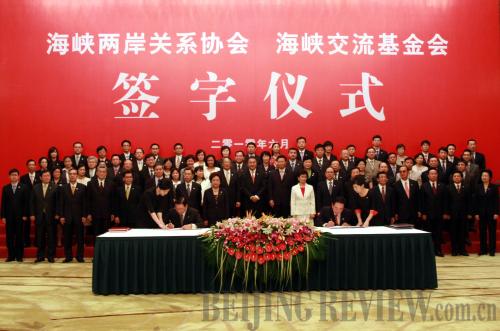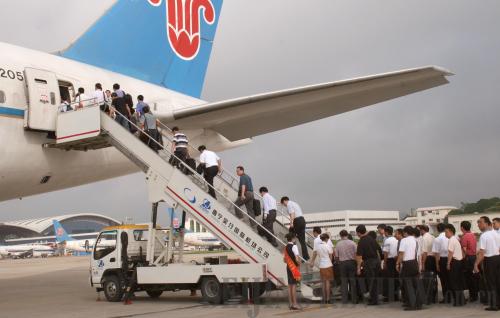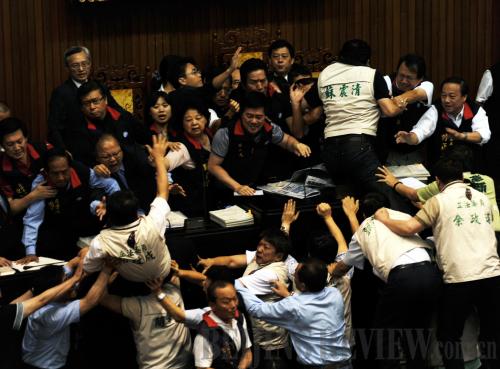|
 |
|
INKING A LANDMARK DEAL: Chen Yunlin (right), President of the Association for Relations Across the Taiwan Straits, and Chiang Pin-kung, Chairman of the Straits Exchange Foundation, attends the signing ceremony of the Economic Cooperation Framework Agreement in Chongqing on June 29 (CFP) |
Chongqing, the southwestern municipality that served as China's capital during World War II, will be remembered again for hosting a landmark event in the Chinese history on June 29. On that day, Chen Yunlin, President of the mainland's Association for Relations Across the Taiwan Straits, and Chiang Pin-kung, Chairman of Taiwan's Straits Exchange Foundation, signed the long-awaited Economic Cooperation Framework Agreement (ECFA) in Chongqing, a move hailed by many as a milestone in cross-Straits relations.
Historic pact
 |
|
PEOPLE TO PEOPLE LINKS: A 1,000-person delegation leaving from Guangxi Zhuang Autonomous Region boards an airplane for Taipei on July 1. It was the first mainland delegation to vi it Taiwan after the signing of the ECFA (LIN YANHUA) |
As a landmark event for the development of cross-Straits relations, the signing of the ECFA ushers in a new era for both sides of the Taiwan Straits and is favorable to the interests of the mainland, Taiwan and the international community. It will also have a profound bearing on peaceful development of cross-Straits relations, as well as prosperity and the stability of East Asia.
The historical impact and important influence of the ECFA are mainly as follow.
First, the free trade pact will facilitate Taiwan's recovery from the global financial crisis. The signing of the ECFA comes from the need that both sides have to respond to more integrated regional economic activities. As for Taiwan's economy, although the ECFA is no panacea, it could be an effective catalyst for improvement. The ECFA can help Taiwan avoid being marginalized in the process of economic globalization and regional economic integration. After it comes into effect, Taiwan can take advantage of the fast growth of the mainland economy to facilitate its economic restructuring and boost the competitiveness of its economy. It can also improve Taiwan's investment environment so as to attract Taiwan's local companies, mainland companies and foreign companies to contribute to Taiwan's economy.
 |
|
BLOODY ARGUMENT: Democratic Progressive Party legislator Kuo Wen-chen falls off the podium while scuffling with Kuomintang legislators at Taiwan's "Legislative Yuan" in Taipei on July 8, as a debate over how to review the ECFA disintegrated into a brawl (CNSPHOTO) |
An impact study on the ECFA by the Chung-hua Institution for Economic Research, which was commissioned by Taiwan's economic affairs authorities, indicates the implementation of the ECFA will give a strong boost to Taiwan's economy, driving up its GDP by 1.65 percent to 1.72 percent, its exports by 4.99 percent and its imports by 7.07 percent. According to the study, Taiwan will have inflow of new foreign direct investment totaling $8.9 billion over the next seven years. A new report by the U.S. think tank, the Peterson Institute for International Economics, says that Taiwan's GDP will grow by about 4.5 percent from the current level due to the effects of the ECFA.
|
